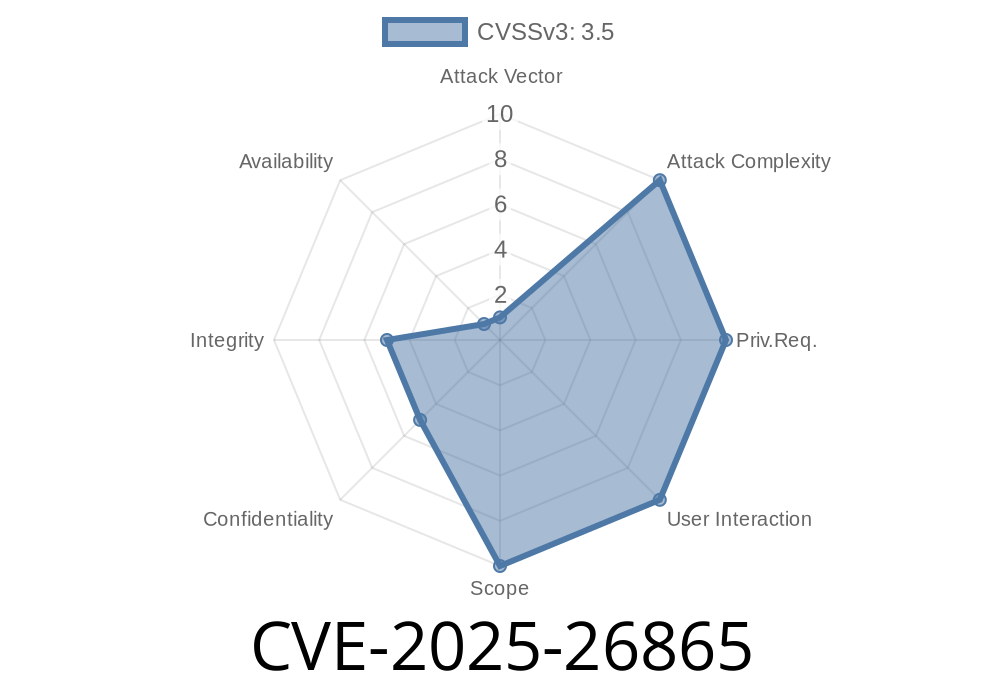In June 2024, a critical vulnerability surfaced in Apache OFBiz — a popular open source enterprise resource planning (ERP) suite used by businesses worldwide. Tracked as CVE-2025-26865, this flaw lurks in the template engine, specifically affecting users running unofficial intermediate builds between versions 18.12.17 and 18.12.18.
> Key takeaway: If you use the official 18.12.17 release, you are safe. The vulnerability exists in the codebase that falls between 18.12.17 and the secure, patched 18.12.18 version. All users on interim or custom builds are at risk.
Explanation
CVE-2025-26865 is an Improper Neutralization of Special Elements Used in a Template Engine vulnerability. In simple terms, the OFBiz template system didn't properly handle special characters. This allowed attackers to inject malicious template code, leading to possible remote code execution (RCE), data leaks, or other exploits.
How It Happened
A regression (or programming mistake that reintroduces a previous bug) was introduced after the official 18.12.17 release, but before 18.12.18 was shipped. If you use an official release, you’re not affected. But those running combinations of patches or custom source builds in this window should upgrade immediately.
Technical Details
At the heart of this vulnerability is insecure template rendering. Think of a template as a blueprint for a web page or document. If the engine doesn’t “neutralize” or safely encode special characters, attackers can trick it into running their own code.
Here’s a (simplified) demonstration of unsafe use in the Freemarker-based OFBiz template engine
// BAD: userInput is not sanitized!
String template = "<p>User Name: ${userInput}</p>";
freemarker.process(template, data);
Suppose userInput is
${''.getClass().forName('java.lang.Runtime').getRuntime().exec('ls')}
If the template engine blindly processes this, it might execute system commands!
How *should* it be done?
// SAFE: Neutralize special elements
String safeInput = StringEscapeUtils.escapeHtml4(userInput);
String template = "<p>User Name: ${safeInput}</p>";
freemarker.process(template, data);
Exploit Scenario
Step 1: Attacker finds a page or endpoint that renders their input in a template.
Step 2: They send malicious Freemarker expressions, like the payload above.
Step 3: If the regression is present, the OFBiz server might execute the injected code, leading to compromises such as:
Official References
- Apache OFBiz Security Advisories
- CVE-2025-26865 Entry on NVD (To be published)
- OFBiz Release Notes 18.12.18
Safe: 18.12.17 (official release)
- Vulnerable: *Any code base or deployment based on code between 18.12.17 and 18.12.18, including patched or custom builds based on this interim code.*
Safe: 18.12.18 and newer
Remember: Only use official OFBiz releases. Custom or intermediate builds, even with minor manual changes, can introduce risk!
Upgrade to OFBiz 18.12.18 or newer immediately.
Do not patch manually unless you know exactly what you’re doing and have reviewed the security changes from the OFBiz Git repo.
Final Thoughts
The CVE-2025-26865 vulnerability in Apache OFBiz is a serious wake-up call for teams using unofficial or modified builds. Template injection vulnerabilities are notoriously easy to exploit once they’re discovered. Make sure you are running an official, up-to-date OFBiz release — and always keep an eye on the OFBiz security page for the latest news.
Sources
- OFBiz Security Advisories
- Release Notes for 18.12.18
- Apache OFBiz Github
*Want more technical breakdowns like this? Follow our feed for regular security deep dives!*
Timeline
Published on: 03/10/2025 14:15:25 UTC
Last modified on: 03/11/2025 20:15:17 UTC
